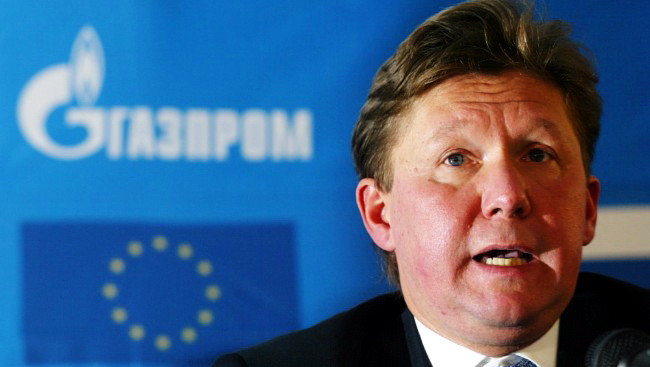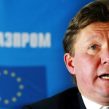
Russian Gas Offensive Tests EU Energy Plans
Publication: Eurasia Daily Monitor Volume: 6 Issue: 60
By:

The intensity of energy-political conflicts in Europe has been subsiding since the Russian-Ukrainian "gas war" in January, but last week Moscow launched a new offensive aiming at three crucial targets: Turkey, Turkmenistan and Ukraine. Leaders of major European states paid scant attention, focusing instead on financial matters on the eve of the G20 summit, and EU policy-making was disrupted by the collapse of the Czech government holding the rotating presidency. Washington was busy polishing its new agenda on Russia and could not grasp the simple point that the lack of energy content reduced the carefully planned Obama-Medvedev "look-in-the-eye" to a public relations exercise, at least as far as Moscow is concerned (RIA-Novosti, March 28). Average European gas export prices will drop from April 1 to just half its record level in the last quarter of 2008, and Gazprom’s revenues on the EU market are expected to shrink to $40 billion compared with $73 billion in 2008, but for Moscow there is still no business like the gas business (Vedomosti, 23 March).
The official visit of Turkmenistan’s President Gurmanguly Berdymukhammedov to Moscow was duly pompous as the protocol prescribes, but nothing was signed and surprisingly little was publicly said about cooperation in the gas sector (Vremya novostei, 26 March). The pipeline along the eastern shore of the Caspian Sea announced as the first priority project in May 2007 is yet to see the first shovel of sand moved along its not too challenging route. The project that is the focus of discussion is the so-called "East-West" pipeline across Turkmenistan, but the deal was postponed without explanation (Kommersant, Nezavisimaya gazeta, March 26). It appears probable that Gazprom does not want to invest in this pipeline until the new route to Russia is opened, suspecting that the trans-Caspian project favored by the West but carefully torpedoed by Moscow might somehow resurface. Russia continues to buy all contracted volumes of gas from Turkmenistan, despite the sharp fall in demand paying the promised "European" price, and Putin and Medvedev fully expected that their friendly embrace would soon deny Berdymukhammedov any freedom for maneuver.
Gazprom’s CEO Aleksei Miller last week visited Turkey and reached a preliminary agreement on building the second trunk of the Blue Stream pipeline (Kommersant, March 27). The first line was completed back in 2003, but quarrels about prices and volumes have continued ever since, so in 2008 only ten billion cubic meters (bcm) were delivered, while the capacity is 16 bcm. The Turkish market is saturated, so the only point in expanding Blue Stream is for export, and Israel has been mentioned as a potential customer. More promising, however, is an option for channeling this new Russian gas together with supplies from Azerbaijan towards South-Eastern Europe through a new pipeline, which could perhaps be renamed Prince Igor instead of Nabucco. For Russia, the main attraction of this option would be Turkey’s consent on building the South Stream pipeline across its exclusive economic zone from Novorossiysk to Varna.
Developments related to Ukraine were of a very different character because the main event was the announcement of the agreement between the EU Commission and Kiev (represented, in a rare show of unity, by both President Yushchenko and Prime Minister Timoshenko) on a 2.5 billion euro loan for reconstructing the gas infrastructure (Lenta.ru, March 27). Gazprom’s delegation demonstratively left the conference where the agreement was struck, and Putin lambasted that "politicized declaration" as "unprofessional" and "senseless" (Kommersant, March 25). Medvedev duly canceled the consultations with Ukraine on opening a $5 billion stabilization credit. This over-reaction might appear emotional, since Putin has every reason to believe that Timoshenko has outfoxed him and slipped out of the bilateral deal that ended the "gas war" in a rather spectacular, even if obscure way (Moscow echo, March 25). The real wrath, however, is focused on the European Commission that is suspected of siding with Ukraine and forgetting that the interests of the main supplier should always come first.
There is no doubt in Moscow that the gas infrastructure in Ukraine urgently needs modernization, but there is also a firm conviction that giving money to Naftogaz or any other Ukrainian company in the pre-election political situation makes no practical sense. The EU Commission is therefore seen as spinning a new gas-political intrigue, and in Putin’s assessment it has engaged in a battle that it has no chance of winning (Nezavisimaya gazeta, March 27). Prioritizing Ukraine certainly goes against the EU goal of diversification of both the sources and transit routes for gas; it also clashes with diversification "Gazprom-style" that focuses on opening two new channels under the Baltic and Black seas. Medvedev is going to make a stop in Berlin on his way to the G20 summit in London to touch on gas issues and establish that the EU Commission is guilty not only in showing gross disrespect to Russia but also in neglecting the interests of European energy "champions," not to mention consumers (Gazeta.ru, March 25).
It is entirely possible that Moscow will succeed in torpedoing the EU-Ukraine deal, and that the Nabucco project will quietly succumb to hostile attitudes and design flaws, and that most European expectation about alternative energy sources will prove false. It does not mean, however, that Putin’s vision of Europe disunited by asymmetric energy dependencies and of Russia harvesting rich political dividends from its gas power will come true. European unity is indeed severely tested by the crisis and Moscow misses no opportunity to add to the strain; Russia’s own state-project is, however, subjected to an even harsher test – and an aggressive gas policy combined with a confrontational security line could prove to be self-defeating. Putin aims at getting Russia out of the crisis and back to petro-prosperity and centrally-planned stability, but that denies the country a chance to move forward and free itself from dependency on oil-and-gas revenues and escape from the straight-jacket of Putinism.




